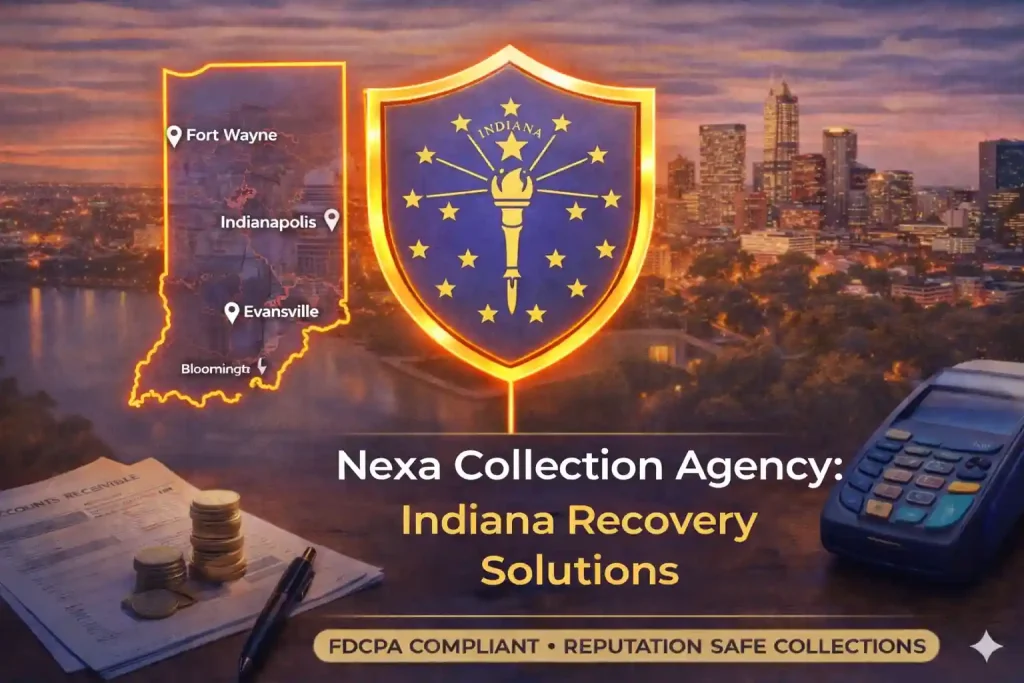
Indiana Medical Collections: We Handle the “Proceedings Supplemental” So You Don’t Have To
Running a medical practice in Indiana is hard enough without trying to play “part-time attorney.”
You know the drill: You finally get a judgment against a non-paying patient, and you expect the money to arrive. It doesn’t. Why? Because in Indiana, a judgment is just a piece of paper until you file for a “Proceedings Supplemental” hearing.
Most “national” collection agencies don’t tell you this. They get the judgment, hit a wall, and close the file. Your revenue stays stuck in the court system.
We are different. We don’t just chase paper; we chase cash. We are a true extension of your business office—handling the complex, time-consuming Indiana specific workflows so your staff can get back to patients.
Nexa provides 100% reputation-safe, equipped with all 50-state collections license, offering free credit reporting, free litigation, free bankruptcy scrubs, and zero onboarding fees. Secure – SOC 2 Type II & HIPAA compliant. Over 2,000 online reviews rate us 4.85 out of 5.
Need a Collection Agency? Contact us
Why Indiana Providers Outsource to Us
We aren’t a law firm; we are a Revenue Cycle Partner. We understand that your goal isn’t to “sue everyone”—it’s to get paid quickly, fairly, and without ruining your reputation in the community.
Here is how we fix the three biggest leaks in your revenue stream:
1. We Break the “Judgment Bottleneck”
-
The Problem: In Indiana, getting a court judgment doesn’t automatically garnish wages. You have to drag the debtor back to court for a second hearing (Proceedings Supplemental) to find out where they work.
-
Our Fix: Your staff doesn’t have time to sit in a county courthouse waiting for a hearing. We do. Our team manages the entire post-judgment process. We handle the filings, the hearings, and the interrogatories to locate assets, turning that “worthless” judgment into a bi-weekly check from the patient’s employer.
2. We Save Your “Accident” Revenue (90-Day Rule)
-
The Problem: Indiana recently shortened the window to file a Hospital Lien to just 90 days post-discharge. If your billing team waits for the “standard” 120-day bad debt cycle to review accident files, that money is already gone.
-
Our Fix: We act as your “Trauma Triage” team. As soon as we see an auto accident code, we check the calendar. If you are within the window, we file the lien immediately to lock in your payment from the insurance settlement—before the patient even sees the check.
3. We Navigate the “Hardship” Bluff
-
The Problem: Debtors in Indiana can easily petition to lower their garnishment from 25% to 10% by claiming “financial hardship.”
-
Our Fix: We don’t just accept their claim. We analyze their finances before we agree to a reduction. Often, we can negotiate a voluntary payment plan that pays you more than the 10% court minimum, simply by offering terms that work for their budget but keep them out of court.
Our “Cash Flow First” Recovery Workflow
We designed this 4-step system to recover maximum revenue while maintaining a professional, “business-first” tone with your patients.
-
Phase 1: The “Hidden Asset” Audit (Free)
Did you know Indiana has a 10-year Statute of Limitations on written contracts? We audit your old “uncollectible” debt. If you have signed financial agreements, we can often revive accounts that other agencies told you were “too old” to touch. -
Phase 2: The Diplomatic Nudge (Flat Fee)
For a low flat rate (approx. $15/account), we send a series of professional, firm letters under our agency name. We educate the patient on the Indiana legal process without making threats. This usually wakes up the 40% of patients who are simply procrastinating. You keep 100% of the money collected here. -
Phase 3: The Negotiation (Contingency)
If they ignore the letters, our team gets on the phones. We explain the reality: “Mr. Smith, avoiding this bill could lead to a ‘Proceedings Supplemental’ hearing where you’ll have to take a day off work to explain your finances to a judge. Let’s set up a $50/month plan and resolve this today.” Cost: 40% of what we collect. -
Phase 4: Legal Execution (Contingency)
For the refusals, we move to legal. We don’t just file suit; we follow through to the garnishment order. We handle the court costs and the headaches. Cost: 50% of what we collect.
Regional Expertise: We Know Your Market
-
Indianapolis & Suburbs: We use digital tools and “Interrogatories” (written questions) to speed up asset location in the busy Marion County courts.
-
Northwest Indiana (The Region): We are experts at garnishing wages from large manufacturing and union employers, ensuring the paperwork meets their strict HR standards.
-
University Towns (Bloomington/Lafayette): We focus on enforcing the “Guarantor” clauses in your intake paperwork to ensure parents are held responsible for student medical bills.
Common Questions
Q: Do I have to pay upfront for legal fees?
A: No. We generally operate on a contingency basis for the collection work. If legal action is required, we discuss court costs with you beforehand, but you never pay us a “retainer” just to work the file.
Q: Can you collect on debt that is 5 years old?
A: In Indiana, YES. If you have a signed intake form (Written Contract), the statute is 10 years. Don’t write that debt off—let us audit it.
Q: How do you handle patient complaints?
A: We treat your patients with dignity. Our calls are recorded, and our agents are trained to be “firm but fair.” We solve the billing dispute so you don’t lose the patient.
Stop letting procedural hurdles block your cash flow.
Click here to Contact Us for a Free Accounts Receivable Audit
